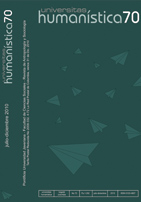Abstract
Urban space is one of the surfaces where the marks are inscribed to keep memory of the genocide perpetrated by the last military dictatorship in Argentina. In the last yeards, various initiatives have intervened onurban space to produce a “descentralized memory” —not exclusionarily anchored—, in the so-called memory places. We began our inquiry by asking whether there is a single recognizable logic behind the practices of
“memory descentralization” or whether, on the contrary, these practices of marking urban space correspond to different yuxtaposed grammars. This reflection will focus on the public space signalling policy the Buenos Aires City Government has made, on one hand, and on the actions of urban space intervention made by the various commissions of collective “Neighborhoods for Memory and Justice”, especially the initiative intitled “Tilings for Memory”.

This journal provides immediate open access to its content on the principle that making research freely available to the public, encourages greater global exchange of knowledge.
The journal Universitas Humanística is registered under a Creative Commons Attribution 4.0 International Public License. Thus, this work may be reproduced, distributed, and publicly shared in digital format, as long as the names of the authors and Pontificia Universidad Javeriana are acknowledged. Others are allowed to quote, adapt, transform, auto-archive, republish, and create based on this material, for any purpose (even commercial ones), provided the authorship is duly acknowledged, a link to the original work is provided, and it is specified if changes have been made. Pontificia Universidad Javeriana does not hold the rights of published works and the authors are solely responsible for the contents of their works; they keep the moral, intellectual, privacy, and publicity rights.
Approving the intervention of the work (review, copy-editing, translation, layout) and the following outreach, are granted through an use license and not through an assignment of rights. This means the journal and Pontificia Universidad Javeriana cannot be held responsible for any ethical malpractice by the authors. As a consequence of the protection granted by the use license, the journal is not required to publish recantations or modify information already published, unless the errata stems from the editorial management process. Publishing contents in this journal does not generate royalties for contributors.


